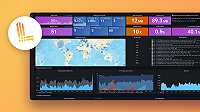Important: This documentation is about an older version. It's relevant only to the release noted, many of the features and functions have been updated or replaced. Please view the current version.
Log Entry Deletion
Log entry deletion is experimental. It is only supported for the BoltDB Shipper index store.
Grafana Loki supports the deletion of log entries from specified streams. Log entries that fall within a specified time window are those that will be deleted.
The Compactor component exposes REST endpoints that process delete requests. Hitting the endpoint specifies the streams and the time window. The deletion of the log entries takes place after a configurable cancellation time period expires.
Log entry deletion relies on configuration of the custom logs retention workflow as defined in Compactor. The Compactor looks at unprocessed requests which are past their cancellation period to decide whether a chunk is to be deleted or not.
Configuration
Enable log entry deletion by setting retention_enabled to true in the Compactor’s configuration. See the example in Retention Configuration.
A delete request may be canceled within a configurable cancellation period. Set the delete_request_cancel_period in the Compactor’s YAML configuration or on the command line when invoking Loki. Its default value is 24h.
Compactor endpoints
The Compactor exposes endpoints to allow for the deletion of log entries from specified streams.
Request log entry deletion
POST /loki/api/admin/delete
PUT /loki/api/admin/deleteQuery parameters:
match[]=<series_selector>: Repeated label matcher argument that identifies the streams from which to delete. At least onematch[]argument must be provided.start=<rfc3339 | unix_timestamp>: A timestamp that identifies the start of the time window within which entries will be deleted. If not specified, defaults to 0, the Unix Epoch time.end=<rfc3339 | unix_timestamp>: A timestamp that identifies the end of the time window within which entries will be deleted. If not specified, defaults to the current time.
A 204 response indicates success.
URL encode the match[] parameter. This sample form of a cURL command URL encodes match[]={foo="bar"}:
curl -g -X POST \
'http://127.0.0.1:3100/loki/api/admin/delete?match[]={foo="bar"}&start=1591616227&end=1591619692' \
-H 'x-scope-orgid: 1'List delete requests
List the existing delete requests using the following API:
GET /loki/api/admin/deleteSample form of a cURL command:
curl -X GET \
<compactor_addr>/loki/api/admin/delete \
-H 'x-scope-orgid: <orgid>'This endpoint returns both processed and unprocessed requests. It does not list canceled requests, as those requests will have been removed from storage.
Request cancellation of a delete request
Loki allows cancellation of delete requests until the requests are picked up for processing. It is controlled by the delete_request_cancel_period YAML configuration or the equivalent command line option when invoking Loki.
Cancel a delete request using this Compactor endpoint:
POST /loki/api/admin/cancel_delete_request
PUT /loki/api/admin/cancel_delete_requestQuery parameters:
request_id=<request_id>: Identifies the delete request to cancel; IDs are found using thedeleteendpoint.
A 204 response indicates success.
Sample form of a cURL command:
curl -X POST \
'<compactor_addr>/loki/api/admin/cancel_delete_request?request_id=<request_id>' \
-H 'x-scope-orgid: <tenant-id>'Was this page helpful?
Related resources from Grafana Labs


